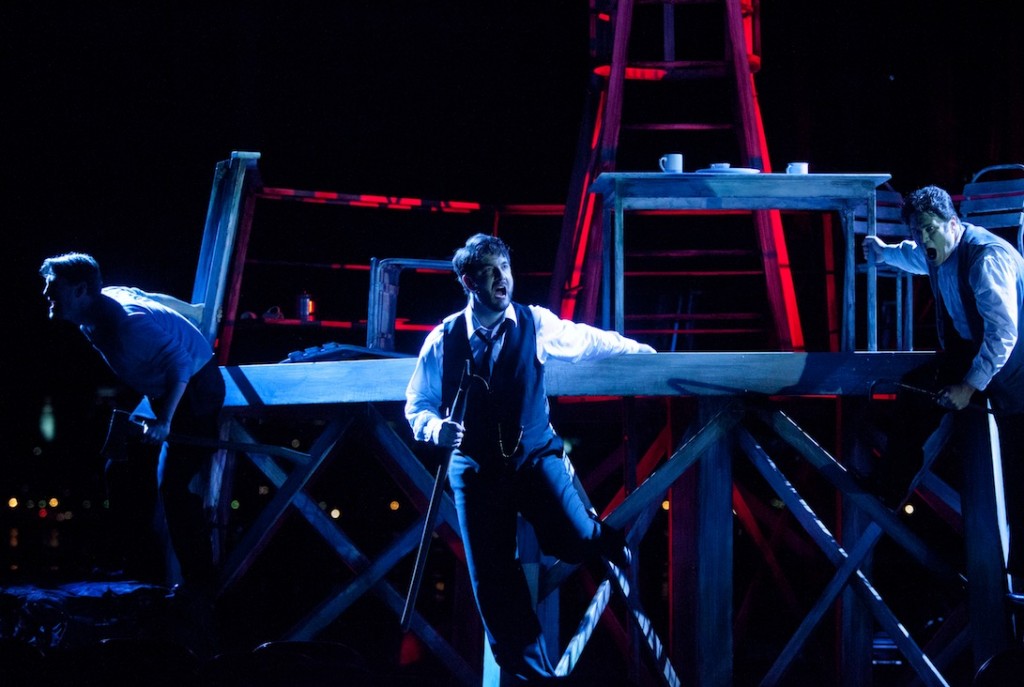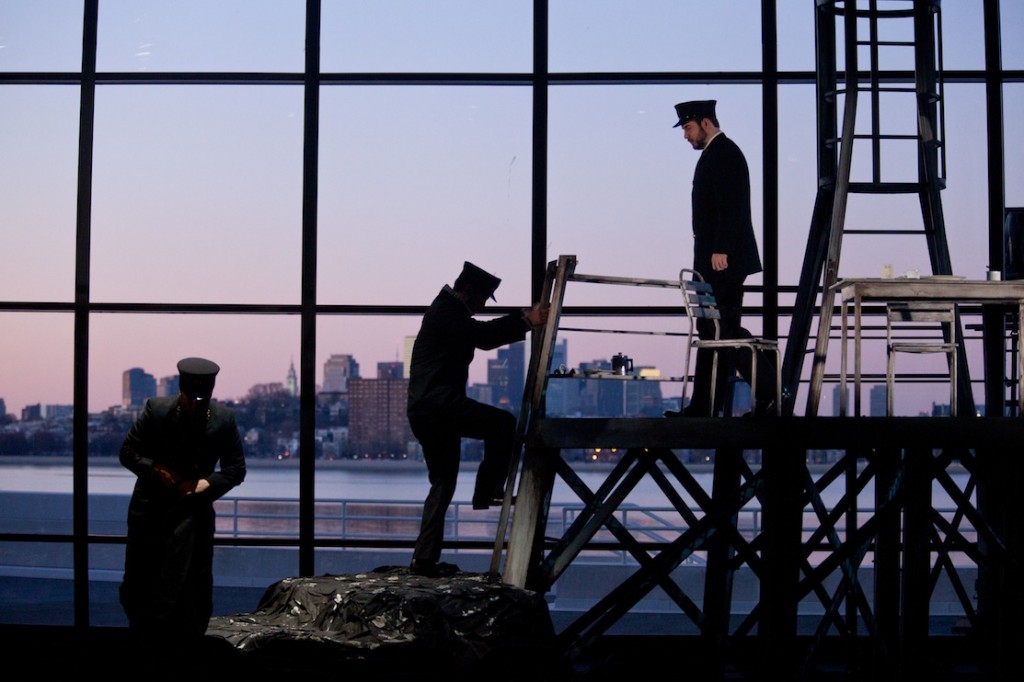BLO serves Maxwell Davies well with a haunting and effective “Lighthouse”

Christopher Burchett, David Cushing, and John Bellemer in Boston Lyric Opera's production of Peter Maxwell Davies' "The Lighthouse." Photo: Erik Jacobs
Good ghost stories stay fresh. So does Peter Maxwell Davies’ The Lighthouse in a production by the Boston Lyric Opera, which opened Wednesday night at the John F. Kennedy Library at the University of Massachusetts/Boston.
The one-act opera is based upon a true story about three lighthouse keepers who vanished from their post on a remote Scottish isle in 1900. In Davies’ imagination, the three men were consumed by ghosts of their own past, ghosts strong enough not only to destroy them, but also to infect the men sent to replace them.
Davies’s opera, which was first staged in 1980 at the Edinburgh Festival, employs a sparse and individual musical language for this psychological thriller-cum-ghost story. The orchestra is small and mostly percussive, featuring a flexatone, a jangly upright piano, and a banjo. The melodic contours are angular, the harmonies craggy, and ghostly elements pervade the score: the first part of the opera enacts the court of inquiry following the keepers’ disappearance, with the part of the judge “voiced” by a French horn. Populist styles, such as hymns and ballads, make ghostly appearances, particularly in the middle of the opera, in which the three lighthouse keeper sing and reminisce–not entirely truthfully–about their pasts.
Taking advantage of the unique assets of the Kennedy Library’s conference room—with floor-to-ceiling windows facing the sea, and the stage extended right into the audience—the audience was literally immersed in this tale of shifting realities, claustrophobia and, ultimately, horror. The climax and denouement of this production proved not wholly satisfactory on opening night, yet the performance was distinguished by a sympathetic staging and excellent musicians.
The singing parts in The Lighthouse are taken entirely by male voices, which, together with the highly percussive chamber orchestra—ably conducted by David Angus—made for a unique and memorable sonic texture. John Bellemer’s lyric tenor negotiated Davies’ declamations with aplomb, and despite some dryness of tone, made the oasis of lyrical singing in the middle of the opera an important and moving counterpoint to the horror.
The role of Arthur, with its apocalyptic pronouncements, was well served by David Cushing’s piercing, dramatic bass-baritone. Christopher Burchett brought a warm and malleable baritone to his character Blazes, as well as a convincing physicality, twitching and strutting in accordance to the schizophrenic demands of the music. The occasional use of head voice by these three men was not altogether successful, but the ensemble singing was a highlight as with their haunting mezza-voce “humming.”
Constructing a physical landscape to complement the sonic effects of Davies’ music is a daunting task and Boston Lyric Opera’s creative team largely met this challenge. Besides subtle directing from Tim Albery and a claustrophobic cage-like stage by Camellia Koo, the most striking item was the blinding searchlight by lighting designer Thomas Hase, which revolved on its perch outside the library, shining in through the windows at the audience. Perhaps the only misfire was the vague way in which the production resolves the “mystery” of exactly how the three lighthouse keepers disappeared. The eeriness uncertainty built into the libretto requires no further ambiguity, and Davies’s tidal wave of percussion shows no hesitance.
The Lighthouse will be repeated 8 p.m. Thursday and Saturday and 5 p.m. Sunday at the John F. Kennedy Presidential Library. blo.org; 617-542-6772.
Posted in Performances

Posted Feb 10, 2012 at 2:57 am by T. Powers
David Cushing is a bass, not a bass-baritone. Listen to timbre, not the range.